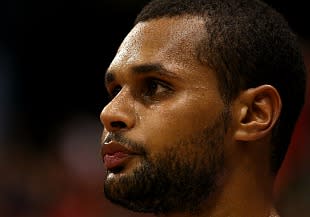Did Patty Mills fake an injury in China?
On Tuesday, Yahoo! Sports' own Adrian Wojnarowski reported that the Xinjiang Flying Tigers of the China Basketball Association had released point guard Patrick Mills from his contract. It was a bit of a curious move considering how much money Xinjiang had invested in Mills for the season, but he'd also missed 10 days with a hamstring injury. Perhaps it was more serious than anyone knew.
Except, if you take Xinjiang at its word, Mills was exaggerating the severity of the injury. Here's the story from the Australian Associated Press:
The 23-year-old left NBL team Melbourne Tigers to sign for Xinjiang in November in a deal reportedly worth upwards of $1 million.
But his relationship with the club deteriorated as they debated the seriousness of the injury.
Mills took to Twitter to fire back at a club release from team general manager Hou Wei which said "due to a fake injury, the Xinjiang team has cut the foreign player Mills".
Mills responded: "Firstly, hammy is doing well and is on track to be back in full swing by next Saturday,'' Mills tweeted.
"That will be 3 (weeks since suffering the injury).
"I had both MRIs sent to my doctor in Aus. It was made clear from the start to EVERYONE that it was a torn hamstring and would take 3-6 weeks (to recover).
"So why the team and doctors over here are saying its not torn, only swelling and should be playing totally defeats me.
"So basically everything in the Chinese media is totally inaccurate and false. Ive been honest and professional throughout.''
You can read those tweets here, if you're so inclined. The bad news for Mills is that his release doesn't clear him to return the NBA -- the CBA can withhold a "letter of clearance" and block him from playing in another league until its season ends in March. So what we have here, no matter if the injury's real or not, is a case in which a team has decided to bar a man from plying his trade anywhere for several months. If it can't have him, no one will.
As the tweets show, Mills believes the available medical evidence supports his claims. Yet even if that's true, the reaction from Xinjiang isn't terribly surprising. Import players -- particularly those with an NBA pedigree -- are expected to act as leaders both on the court and in the locker room, and Mills' desire to let his injury fully heal could have been seen as a shirking of those responsibilities. That doesn't mean that Xinjiang was right to act in this way -- to the contrary, it seems foolish to force Mills to play when he's not 100 percent -- but its expectations are different from teams like the Portland Trail Blazers.
It's yet another example of the culture shock many NBA players have experienced during their lockout-inspired temporary employment. Playing in China requires a different set of expectations than playing in Portland. It's still basketball, but the worlds couldn't be more different.



